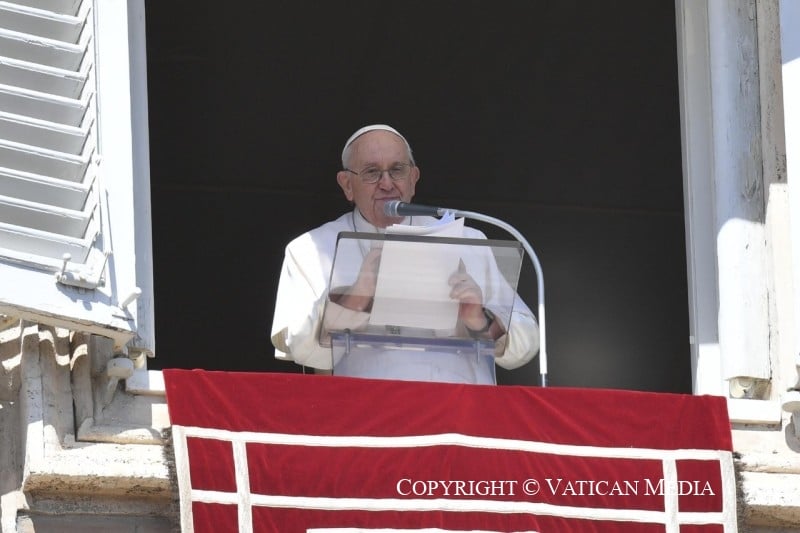At 12 noon today, the Holy Father Francis looked out of the studio window in the Vatican Apostolic Palace to recite the Angelus with the faithful and pilgrims gathered in St. Peter’s Square.
These were the Pope’s words in introducing the Marian prayer:
Before the Angelus
Dear brothers and sisters, buongiorno!
Today’s Gospel recounts the encounter of Jesus with a Canaanite woman outside the territory of Israel (cf. Mt 15:21-28). She asks him to liberate her daughter, who is tormented by a demon. But the Lord pays no attention to her. She insists, and the disciples advise Jesus to acknowledge her so she would stop. Jesus, however, explains that his mission is directed to the children of Israel, using this image: “It is not right to take the children’s bread and throw it to the dogs”. And the courageous woman responds, “Yes, Lord, yet even the dogs eat the crumbs that fall from their master’s table”. Then, Jesus says to her, “‘O woman, great is your faith! Be it done for you as you desire.’ And her daughter was healed instantly” (vv. 26-28). This is a beautiful story. And this happened to Jesus.
We see that Jesus changed his attitude. What made him change it was the strength of the woman’s faith. So, let us pause briefly over these two aspects: the change in Jesus and the woman’s faith.
The change in Jesus. He was directing his preaching to the chosen people. Later the Holy Spirit would push the Church to the ends of the world. But what happens here, we could say, is an anticipation through which the universality of God’s work is already manifested in the episode of the Canaanite woman. Jesus’ openness is interesting. On hearing the woman’s prayer, “he anticipates the plan”; faced with her concrete case, he becomes even more sympathetic and compassionate. This is what God is like: he is love, and the one who loves does not remain rigid. Yes, he or she stands firm, but not rigid, they do not remain rigid in their own positions, but allow themselves to be moved and touched. He or she knows how to change their plans. Love is creative. And we Christians who want to imitate Christ, we are invited to be open to change. How good it would do our relationships, as well as our lives of faith, if we were to be docile, to truly pay attention, to soften up in the name of compassion and the good of others, like Jesus did with the Canaanite woman. The docility to change. Hearts docile to change.
Now let us look at the woman’s faith, which the Lord praises, saying that it is “great” (v. 28). According to the disciples, the only thing that seemed “great” was her insistence; but Jesus sees her faith. If we think about it, that foreign woman had probably little or no awareness of the laws and religious precepts of Israel. What does her faith consist of then? She does not have a wealth of concepts but of deeds – the Canaanite woman draws near, prostrates herself, insists, takes part in a frank dialogue with Jesus, overcomes every obstacle just to speak with him. This is the concreteness of faith, which is not a religious label but is a personal relationship with the Lord. How many times we fall into the temptation to confuse faith with a label! This woman’s faith is not fraught with theological gallantry, but with insistence – she knocks at the door, knocks, knocks. Her faith is not made up of words, but of prayer. And God does not resist when he is prayed to. This is why he said, “Ask, and it will be given to you; seek, and you will find; knock, and it will be opened to you” (Mt 7:7).
Brothers and sisters, in light of all this, we can ask ourselves a few questions beginning with the change in Jesus. For example: Am I capable of changing opinion? Do I know how to be understanding and do I know how to be compassionate, or do I remain rigid in my position? Is there some rigidity in my heart? Which is not firmness: rigidity is awful, firmness is good. And beginning with the woman’s faith: What is my faith like? Does it stop at concepts and words, or is it truly lived with prayer and deeds? Do I know how to dialogue with the Lord? Do I know how to insist with him? Or am I content to recite beautiful formulas? May Our Lady make us open to what is good and concrete in the faith.










